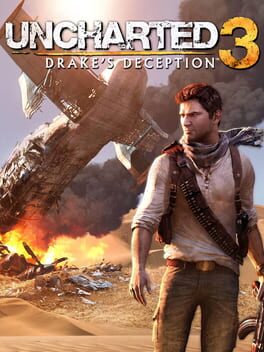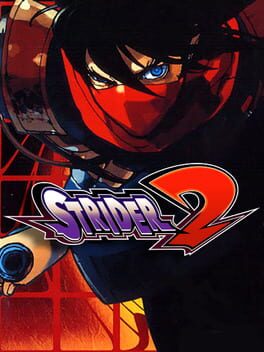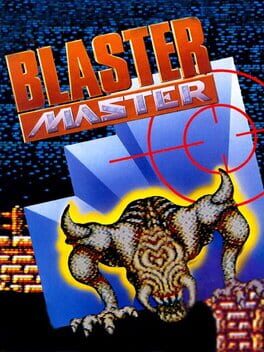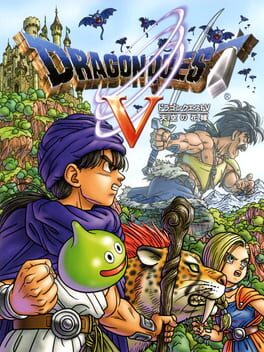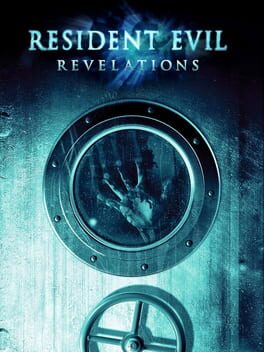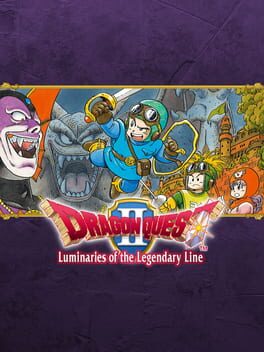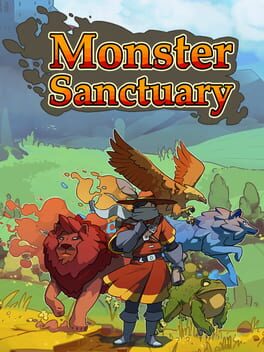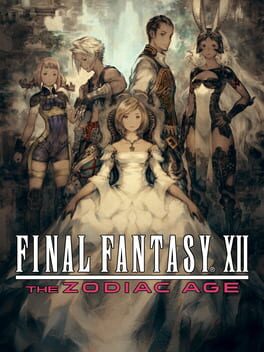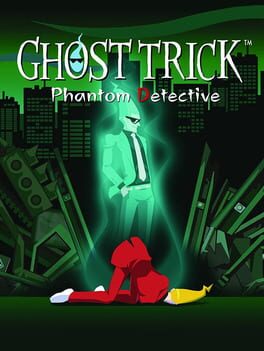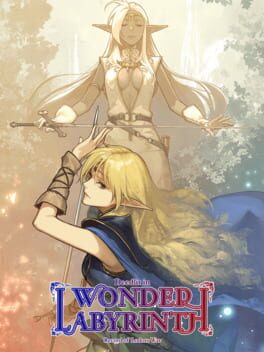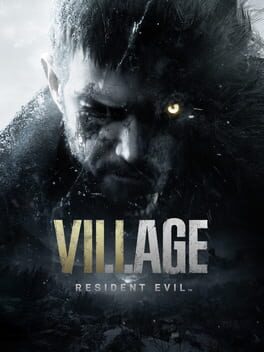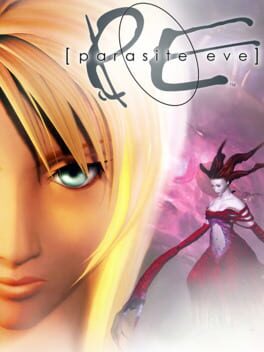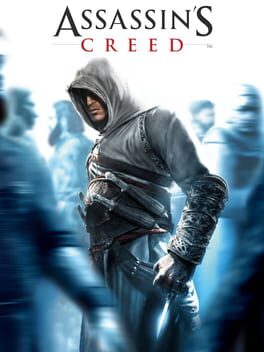Artur
Ok, so this isn't as cohesive as 2, but good lord this game's shootouts are constantly changing it up. It seems that every enemy encounter throws something different at you. That plus the truly spectacular set-pieces make this game feel the most "larger than life" of the trilogy
The soundtrack is also a step up from 2, which was already a huge step up from 1.
The puzzles are also faaar more elaborate and interesting than the previous games, and so is the melee combat system. But this game also has way too many melee encounters, to the point of being kinda silly. Everytime I encountered one of those unarmed big dudes, I sighed a bit.
I don't know if I like Hard mode as much as 2's, they cranked up the damage a bit too much. Or better yet, enemies are too good a shot - you face someone with a machine gun, they're gonna hit every shot at you, and you'll be dead in 4 shots lol
The soundtrack is also a step up from 2, which was already a huge step up from 1.
The puzzles are also faaar more elaborate and interesting than the previous games, and so is the melee combat system. But this game also has way too many melee encounters, to the point of being kinda silly. Everytime I encountered one of those unarmed big dudes, I sighed a bit.
I don't know if I like Hard mode as much as 2's, they cranked up the damage a bit too much. Or better yet, enemies are too good a shot - you face someone with a machine gun, they're gonna hit every shot at you, and you'll be dead in 4 shots lol
I'm not crazy in love like most people: the writing can be dense to a fault (or I'm too stupid to absorb it all), it's prone to rambling, I zoned out during certain lore dumps, etc.
But this is definitely one of the better-written pieces of media I've ever seen. The narrator and skills talking to you works incredibly well, and is further boosted by the VA. I don't know how well it works without the voices tbh
Every character is fully realized, which is an incredible achievement, and plenty of side stories really stuck with me: the bookstore lady sidequest, and René storyline to name a couple
Plus, it gives you a lot of food for thought, and I find myself reflecting on its themes and meanings. Despite the chaotic world, and a protagonist who... doesn't even his shit together to say the least, I think Disco Elysium ends up with an ultimately hopeful and optimistic themes. Though this may be a case of different interpretations
Movements kinda sucks though, and I still don't understand why fast travel is so specific
But this is definitely one of the better-written pieces of media I've ever seen. The narrator and skills talking to you works incredibly well, and is further boosted by the VA. I don't know how well it works without the voices tbh
Every character is fully realized, which is an incredible achievement, and plenty of side stories really stuck with me: the bookstore lady sidequest, and René storyline to name a couple
Plus, it gives you a lot of food for thought, and I find myself reflecting on its themes and meanings. Despite the chaotic world, and a protagonist who... doesn't even his shit together to say the least, I think Disco Elysium ends up with an ultimately hopeful and optimistic themes. Though this may be a case of different interpretations
Movements kinda sucks though, and I still don't understand why fast travel is so specific
1999
If you just want to finish this game, you can just rush towards the end without a care in the world, since you have unlimited continues, and just respawn on the spot. The rating system will tell you that you suck though.
This rating system is what makes this game brutal, if you decide that you want to A-rank or, God forbid, Star-rank it, which requires doing it very fast, getting as many points as possible, and not getting hit once.
Super appealing art style too. Very easy game to pick-up-and-play, and it's cool that it's as hard as you want it to be - you can change the strength of Strider's blade to a ridiculous level, just by changing a simple in-game option. Plus, when you finish the game, you unlock Strider Hien, who's incredibly satisfying to use.
This rating system is what makes this game brutal, if you decide that you want to A-rank or, God forbid, Star-rank it, which requires doing it very fast, getting as many points as possible, and not getting hit once.
Super appealing art style too. Very easy game to pick-up-and-play, and it's cool that it's as hard as you want it to be - you can change the strength of Strider's blade to a ridiculous level, just by changing a simple in-game option. Plus, when you finish the game, you unlock Strider Hien, who's incredibly satisfying to use.
1988
Some people call this a "metroidvania", but it's really a prototype of that. It's too early in gaming history to actually be one, as the designers couldn't let go of traditional action platformers design philosophies.
There is an interconnected world, you do acquire new powers that open new doors, but it's really a linear adventure that takes you through some huge levels, and halfway through the game requires you to backtrack to the very beginning for totally arbitrary reasons. Exploration isn't really encouraged because there are no secrets or shortcuts or power-ups other than the ones you get from beating the area bosses. Exploring will really only take you to dead ends.
The instruction manual gives you a "map" for most of the areas (areas 4 and 5 don't have one for some reason?), but around area 2 or 3, you'll realize that the map is worthless, and you'll google a proper map online.
Using save states, this is a nice game, but I'm thinking of the poor kids that played this on an actual NES back in the day, and it was probably miserable? There are no passwords and no saving, you have to do it in one sitting, an absurd design choice considering the size of the game. The north american release features limited continues - that is insane.
Especially considering that the last couple of bosses have RNG-based attacks. I rewinded the hell out of them, I'm not sure how players are expected to get better, there is no pattern or wind-up for the attacks. And then the last area is a bunch of time-wasting design, some pixel perfect jumps, and that terribly designed wall-walking mechanic which is sure to give you lots of damage.
Finally, the top-down portions are a nice change of pace, but the choice to lose your gun upgrades when you take a hit is... curious.
This game is basically another example to the philosophy of 80s designers, where they punished the player as much as possible for whatever reason.
I'm legit not sure if one can finish this game as originally intended. With save states and rewinds, it's nice though.
There is an interconnected world, you do acquire new powers that open new doors, but it's really a linear adventure that takes you through some huge levels, and halfway through the game requires you to backtrack to the very beginning for totally arbitrary reasons. Exploration isn't really encouraged because there are no secrets or shortcuts or power-ups other than the ones you get from beating the area bosses. Exploring will really only take you to dead ends.
The instruction manual gives you a "map" for most of the areas (areas 4 and 5 don't have one for some reason?), but around area 2 or 3, you'll realize that the map is worthless, and you'll google a proper map online.
Using save states, this is a nice game, but I'm thinking of the poor kids that played this on an actual NES back in the day, and it was probably miserable? There are no passwords and no saving, you have to do it in one sitting, an absurd design choice considering the size of the game. The north american release features limited continues - that is insane.
Especially considering that the last couple of bosses have RNG-based attacks. I rewinded the hell out of them, I'm not sure how players are expected to get better, there is no pattern or wind-up for the attacks. And then the last area is a bunch of time-wasting design, some pixel perfect jumps, and that terribly designed wall-walking mechanic which is sure to give you lots of damage.
Finally, the top-down portions are a nice change of pace, but the choice to lose your gun upgrades when you take a hit is... curious.
This game is basically another example to the philosophy of 80s designers, where they punished the player as much as possible for whatever reason.
I'm legit not sure if one can finish this game as originally intended. With save states and rewinds, it's nice though.
What a great rpg, fantastic starting point for the series. Very cozy, the orchestrated soundtrack of this version is great, and it has shockingly strong narrative beats. I think I can get away with saying that this is the very first JRPG with a strong story beginning to end, releasing in 1992 (1991's FFIV fumbles the landing with some questionable plot points).
Dragon Quest V's narrative really appealed to me on its subtlety - there's a moment in particular involving an NPC you met like 30 in-game hours ago, and it's just a single (optional) text box, and it really stuck with me.
The party talk feature in particular was incredible to me, tons of effort were put into that - your (human) companions have something to say about pretty much every event and NPC dialogue in the entire game. It does a great job at fleshing out your characters, your silent Hero included.
The monster catching thing ends up feeling more like a gimmick than a proper mechanic, since it's entirely RNG-based, and there's nothing you can do to influence it. It's one of the pioneers of monster-catching RPGs (not quite the pioneer, as Megami Tensei released about five years earlier), but it still felt underdeveloped
There were a couple of times where I felt there was poor conveyance, and I had to quickly look at a guide: first to find the fairy forest, a location that is only given to you by a random nun in an abbey you have no reason to return. Not sure how devs expected players to find this, other than dumb luck (one of my party members just so happened to mention "a nun" in party talk - not terribly specific, but at least it narrowed it down a bit), or brute forcing
And the second time, where you need to talk to an NPC multiple times to trigger an event. This is the only time where an NPC whose text doesn't change after multiple interactions actually has more to say if you keep insisting, so it was poorly handled imo.
Beyond those issues, a lovely game, with great pacing, and intense endgame bosses - intense turn-based bosses are really appealing to me. Great way to start my Dragon Quest journey (though I technically started it by beating the mobile version of DQ1...)
Dragon Quest V's narrative really appealed to me on its subtlety - there's a moment in particular involving an NPC you met like 30 in-game hours ago, and it's just a single (optional) text box, and it really stuck with me.
The party talk feature in particular was incredible to me, tons of effort were put into that - your (human) companions have something to say about pretty much every event and NPC dialogue in the entire game. It does a great job at fleshing out your characters, your silent Hero included.
The monster catching thing ends up feeling more like a gimmick than a proper mechanic, since it's entirely RNG-based, and there's nothing you can do to influence it. It's one of the pioneers of monster-catching RPGs (not quite the pioneer, as Megami Tensei released about five years earlier), but it still felt underdeveloped
There were a couple of times where I felt there was poor conveyance, and I had to quickly look at a guide: first to find the fairy forest, a location that is only given to you by a random nun in an abbey you have no reason to return. Not sure how devs expected players to find this, other than dumb luck (one of my party members just so happened to mention "a nun" in party talk - not terribly specific, but at least it narrowed it down a bit), or brute forcing
And the second time, where you need to talk to an NPC multiple times to trigger an event. This is the only time where an NPC whose text doesn't change after multiple interactions actually has more to say if you keep insisting, so it was poorly handled imo.
Beyond those issues, a lovely game, with great pacing, and intense endgame bosses - intense turn-based bosses are really appealing to me. Great way to start my Dragon Quest journey (though I technically started it by beating the mobile version of DQ1...)
Ooooh, this one. I had an RE marathon in 2020, and Revelations seemed interesting enough - I distinctly remember people lauding this as a "return to form" back when it came out, though I'm now convinced that the franchise was sunk into such a blur of an action-fest, that anything remotely resembling survival horror was seen as a breath of fresh air. Brace yourselves, I have a lot to talk about this game.
I... really didn't like Revelations. It really, really wants to evoke the classical REs and in some, very brief moments, it kinda succeeds: getting to the ship's main hall is a great moment, and I remember thinking "ok, this is it, this where the game actually begins". Nope. Here's the thing:
• No inventory management. No no, instead you get a limit of 5 herbs you can carry (can't combine them, don't get any crazy ideas), and a limit on how much ammo you can carry on each clip. This game drowns you in resources, BUT you can't pick anything up because you're most likely full. So you have to leave a lot of stuff on the ground because the game decided you can't have them. In the classic games this supposedly evokes, you could just run back to an item box and dump stuff there to make room for a new item. Here, if you're full and wanna get the ammo, you need to... spend the ammo already on you. It's "resource scarcity" by artificial limitation, and it is utter crap.
• There's "item boxes". Though not really. They look like them, but it's just for changing your guns. Not a huge deal, but it's just another example of this game pretending to be like classic RE.
• Puzzles, heh. Instead of a stone to move a statue to get an amulet to open a box to get the key to the other side of the room, complete with ridiculously convoluted contraptions that should not be in a cruise ship, it's just go this way, kill a bunch of enemies, maybe a boss, get a key, go back and open the door.
You know, just like RE4 and 5, but... without the fun action. You know how satisfying it is to land a headshot in RE4 and 5? Forget that, gunplay is now super unsatisfying and lacking any oomph. The enemy designs are all incredibly boring. And the first boss, good lord. It's like the tight corridors of RE1's mansion, but now with infinitely respawning enemies (literally, they don't stop coming until you kill the boss) and a bullet sponge of a boss! Also, forget about killing enemies to get money to upgrade your weapons. That gameplay loop was too much fun I suppose.
The game also punctuates the already boring Jill sections with amazingly bland corridor-fests with other characters. Think of the most drab third-person shooter, and here it is. I actually youtube'd the rest of the game, and found out there's a turret section later on. I'm not really surprised come to think of it.
Man I haven't even talked about the scanning mechanic, the most pointless thing I've seen in a while. I still don't understand what they were going for.
The best way to describe this game, is that it feels like a random mid-budget third-party company attempt at replicating Resident Evil. A bootleg in other words. It completely fails at being a survival horror, it completely fails at being an action game. Nobody wins here. I am completely baffled that people can find real enjoyment at ANY aspect of this game. When I dislike a game, I can usually see "yeah ok, I get why you'd like this"
I'm drawing a blank on this one. It has a modestly high metacritic score, and it's sitting at a generous 3.2 average here in this site, and I honest to God have no idea why.
If you actually like this game, I urge you to reply to this review explaining to me why that is. I'm legitimately curious.
Oh, and the story is stupid. Not fun stupid like RE4 or 5, just dumb really. RE6 is the better game, just saying. That one is a disjointed mess, but it can at least be a fun action game at points.
I... really didn't like Revelations. It really, really wants to evoke the classical REs and in some, very brief moments, it kinda succeeds: getting to the ship's main hall is a great moment, and I remember thinking "ok, this is it, this where the game actually begins". Nope. Here's the thing:
• No inventory management. No no, instead you get a limit of 5 herbs you can carry (can't combine them, don't get any crazy ideas), and a limit on how much ammo you can carry on each clip. This game drowns you in resources, BUT you can't pick anything up because you're most likely full. So you have to leave a lot of stuff on the ground because the game decided you can't have them. In the classic games this supposedly evokes, you could just run back to an item box and dump stuff there to make room for a new item. Here, if you're full and wanna get the ammo, you need to... spend the ammo already on you. It's "resource scarcity" by artificial limitation, and it is utter crap.
• There's "item boxes". Though not really. They look like them, but it's just for changing your guns. Not a huge deal, but it's just another example of this game pretending to be like classic RE.
• Puzzles, heh. Instead of a stone to move a statue to get an amulet to open a box to get the key to the other side of the room, complete with ridiculously convoluted contraptions that should not be in a cruise ship, it's just go this way, kill a bunch of enemies, maybe a boss, get a key, go back and open the door.
You know, just like RE4 and 5, but... without the fun action. You know how satisfying it is to land a headshot in RE4 and 5? Forget that, gunplay is now super unsatisfying and lacking any oomph. The enemy designs are all incredibly boring. And the first boss, good lord. It's like the tight corridors of RE1's mansion, but now with infinitely respawning enemies (literally, they don't stop coming until you kill the boss) and a bullet sponge of a boss! Also, forget about killing enemies to get money to upgrade your weapons. That gameplay loop was too much fun I suppose.
The game also punctuates the already boring Jill sections with amazingly bland corridor-fests with other characters. Think of the most drab third-person shooter, and here it is. I actually youtube'd the rest of the game, and found out there's a turret section later on. I'm not really surprised come to think of it.
Man I haven't even talked about the scanning mechanic, the most pointless thing I've seen in a while. I still don't understand what they were going for.
The best way to describe this game, is that it feels like a random mid-budget third-party company attempt at replicating Resident Evil. A bootleg in other words. It completely fails at being a survival horror, it completely fails at being an action game. Nobody wins here. I am completely baffled that people can find real enjoyment at ANY aspect of this game. When I dislike a game, I can usually see "yeah ok, I get why you'd like this"
I'm drawing a blank on this one. It has a modestly high metacritic score, and it's sitting at a generous 3.2 average here in this site, and I honest to God have no idea why.
If you actually like this game, I urge you to reply to this review explaining to me why that is. I'm legitimately curious.
Oh, and the story is stupid. Not fun stupid like RE4 or 5, just dumb really. RE6 is the better game, just saying. That one is a disjointed mess, but it can at least be a fun action game at points.
Long-running franchises having a lackluster 2nd game that is still considered the "black sheep", name a more iconic duo.
At first, I was thinking this'd be a bit better than DQ1, but as I kept playing, I realized that DQ2 really does kinda suck. The entire design philosophy was very clearly "let's just make Dragon Quest but bigger!".
The original game was nothing but a grindfest but it was over in about 5 hours (at least in these modern ports) - DQ2, with very liberal use of a guide, took me about 10 hours. And speaking of guides, this game requires one, it's nearly unplayable without it.
DQ1, if you talked to every NPC, was a very straightforward adventure that always gave you a direction (with one or two exceptions). DQ2 starts out that way, but as soon as you get the boat you are thrown into a massive overworld with zero direction to speak of - I think the devs expected players to just explore every portion of the map which I guess made sense in that particular time frame? NPCs give you only hints about where to find the plot MacGuffins, many of which are just... lying on the ground in an arbitrary piece of the land.
Even the dungeons are "the same, but bigger", they are absolute mazes, with very high encounter ratios. After a while, I got tired of getting into a lot of dead ends, and resorted to guides for the dungeons as well.
Even as a piece of history this game is not interesting. "oh it introduced parties", then you realize that: 1, this game's party is merely the DQ1's Hero split into three characters and 2, Final Fantasy came out the very same year, and featured a 4-character party, where each could be one of six different classes.
And narratively, Phantasy Star also came out in 1987, and was arguably the very first JRPG to take a step forward in the stoytelling. So Dragon Quest II is nothing but a side step or, at most, half step forward - just a footnote in JRPG history, especially since Dragon Quest III came out a mere year later.
I only finished this because I played it on my phone during any downtimes I had. Credit where credit is due, I never actively stopped to grind in this game, I just went with the flow and that made me strong enough to defeat the final boss - a rather intense battle. I was several levels below what the guide I followed recommended me, so it is perfectly doable to just not grind in this game.
But yikes. If it was 5 hours like the first game, I'd probably have enjoyed it more.
If you are curious about DQ2 though, don't even consider playing any other version other than the mobile/Switch port
In this version, Zoom just gives you a list of every town you ever visited so you can teleport there
In every other version, Zoom merely teleports you to the last town you saved at. That sounds like a fucking nightmare.
At first, I was thinking this'd be a bit better than DQ1, but as I kept playing, I realized that DQ2 really does kinda suck. The entire design philosophy was very clearly "let's just make Dragon Quest but bigger!".
The original game was nothing but a grindfest but it was over in about 5 hours (at least in these modern ports) - DQ2, with very liberal use of a guide, took me about 10 hours. And speaking of guides, this game requires one, it's nearly unplayable without it.
DQ1, if you talked to every NPC, was a very straightforward adventure that always gave you a direction (with one or two exceptions). DQ2 starts out that way, but as soon as you get the boat you are thrown into a massive overworld with zero direction to speak of - I think the devs expected players to just explore every portion of the map which I guess made sense in that particular time frame? NPCs give you only hints about where to find the plot MacGuffins, many of which are just... lying on the ground in an arbitrary piece of the land.
Even the dungeons are "the same, but bigger", they are absolute mazes, with very high encounter ratios. After a while, I got tired of getting into a lot of dead ends, and resorted to guides for the dungeons as well.
Even as a piece of history this game is not interesting. "oh it introduced parties", then you realize that: 1, this game's party is merely the DQ1's Hero split into three characters and 2, Final Fantasy came out the very same year, and featured a 4-character party, where each could be one of six different classes.
And narratively, Phantasy Star also came out in 1987, and was arguably the very first JRPG to take a step forward in the stoytelling. So Dragon Quest II is nothing but a side step or, at most, half step forward - just a footnote in JRPG history, especially since Dragon Quest III came out a mere year later.
I only finished this because I played it on my phone during any downtimes I had. Credit where credit is due, I never actively stopped to grind in this game, I just went with the flow and that made me strong enough to defeat the final boss - a rather intense battle. I was several levels below what the guide I followed recommended me, so it is perfectly doable to just not grind in this game.
But yikes. If it was 5 hours like the first game, I'd probably have enjoyed it more.
If you are curious about DQ2 though, don't even consider playing any other version other than the mobile/Switch port
In this version, Zoom just gives you a list of every town you ever visited so you can teleport there
In every other version, Zoom merely teleports you to the last town you saved at. That sounds like a fucking nightmare.
2020
There is such a thing as doing too much, and by God is this game guilty of that.
On top of the "which monsters do I want" thing that's inherent to monster-catching rpgs, every monster also has a skill tree, leaving you to consider what kind of role it'll play in battle (you can unlock a good chunk of it by max level, but not all of it, so you do have to commit, though it is possible to reset the tree with some common, buyable items).
Each one also has four, count them, four equipment slots that you absolutely cannot ignore - each of these can also be upgraded up to +5 using crafting materials. This is annoying, as traditional equipment is very much a no-no in monster-catching rpgs, imo.
And then - yes there is indeed more - you eventually acquire the ability to change every monster to either Light or Dark forms, each one possessing one passive skill, and I didn't even mention each monster having elemental weaknesses and resistances, as you'd expect from the genre.
It's a lot to keep track of, too much I would argue. Here's a game that encourages switching monsters around (every egg you hatch comes in the level of your current party), but makes it kind of a pain to actually switch them around a lot. There's no "transfer equipment" or "optimize gear" button, you're stuck doing it manually.
I also get the feeling they focused more on the post-game than anything. The amount of cool shit I've encountered when I was almost done is crazy. "Oh, that sounds cool, I'd like to use that", but then just thinking of switching around my already pretty good party, nah.
With so much stuff to keep track of, this game's balancing suffers - debuffs feel particularly better than just about any other strategy - if you look around, you'll find tons of guides that tell you to use a debuff party to 5-star the Champions.
Some of the skills on the trees can also be difficult to determine how good they are at first glance, since there's a lot of RNG involved.
Still, as you can tell by the rating, I did enjoy the game quite a bit, playing it for 40+ hours doing a ton of optional stuff (including defeating every single Champion). I just wish the devs didn't throw literally everything in this game, as I have no doubt I would have enjoyed it even more.
It does help I'm a metroidvania whore and find turn-based RPGs super chill.
It's one of those games that verge on true greatness. Almost there, but there's some too obvious flaws
On top of the "which monsters do I want" thing that's inherent to monster-catching rpgs, every monster also has a skill tree, leaving you to consider what kind of role it'll play in battle (you can unlock a good chunk of it by max level, but not all of it, so you do have to commit, though it is possible to reset the tree with some common, buyable items).
Each one also has four, count them, four equipment slots that you absolutely cannot ignore - each of these can also be upgraded up to +5 using crafting materials. This is annoying, as traditional equipment is very much a no-no in monster-catching rpgs, imo.
And then - yes there is indeed more - you eventually acquire the ability to change every monster to either Light or Dark forms, each one possessing one passive skill, and I didn't even mention each monster having elemental weaknesses and resistances, as you'd expect from the genre.
It's a lot to keep track of, too much I would argue. Here's a game that encourages switching monsters around (every egg you hatch comes in the level of your current party), but makes it kind of a pain to actually switch them around a lot. There's no "transfer equipment" or "optimize gear" button, you're stuck doing it manually.
I also get the feeling they focused more on the post-game than anything. The amount of cool shit I've encountered when I was almost done is crazy. "Oh, that sounds cool, I'd like to use that", but then just thinking of switching around my already pretty good party, nah.
With so much stuff to keep track of, this game's balancing suffers - debuffs feel particularly better than just about any other strategy - if you look around, you'll find tons of guides that tell you to use a debuff party to 5-star the Champions.
Some of the skills on the trees can also be difficult to determine how good they are at first glance, since there's a lot of RNG involved.
Still, as you can tell by the rating, I did enjoy the game quite a bit, playing it for 40+ hours doing a ton of optional stuff (including defeating every single Champion). I just wish the devs didn't throw literally everything in this game, as I have no doubt I would have enjoyed it even more.
It does help I'm a metroidvania whore and find turn-based RPGs super chill.
It's one of those games that verge on true greatness. Almost there, but there's some too obvious flaws
2018
Me at 11h59: "I can't believe Final Fantasy XVI has nothing to do with previous FFs, when you make a new entry in an established franchise, there are certain expectations to be met"
Me at 00h00: "Dad of War goes 9/10"
My burning hypocrisy aside, this really has nothing to do with previous entries in the series, gameplay-wise, and anyone who holds that against this game is honestly in the right.
That being said, I did have similar spots in my brain tickled: the combat is visceral and satisfying in a different way, and it provides impressive scale but also in a different way - instead of insane battles, you get some impressive locations and scenery and cutscene direction, the "one-shot" camera gimmick does its job in giving the story moments a bigger gravitas.
The camera during combat is the most common criticism, and while I do agree it can be an issue, I legit didn't think it was that bad. The inclusion of crafting and RPG elements are dangerously close to "generic AAA trope", but I think it's handled well, offering the possibility to create a few builds with slightly different playstyles.
Really, this Sony's "wide linear" design to their AAA cinematic games is just incredibly appealing to me. Does it make every game in their library homogeneous? Kinda, but at least they have perfected this one formula.
Though I don't think the story is amazing, it was good enough, and the smaller scale helped keep it somewhat refreshing. The references to the Greek games made me giggle like a fanboy.
I was shocked to see it's not a particularly strong game when it comes to the bosses, which is a bit of a crime for this series.
Me at 00h00: "Dad of War goes 9/10"
My burning hypocrisy aside, this really has nothing to do with previous entries in the series, gameplay-wise, and anyone who holds that against this game is honestly in the right.
That being said, I did have similar spots in my brain tickled: the combat is visceral and satisfying in a different way, and it provides impressive scale but also in a different way - instead of insane battles, you get some impressive locations and scenery and cutscene direction, the "one-shot" camera gimmick does its job in giving the story moments a bigger gravitas.
The camera during combat is the most common criticism, and while I do agree it can be an issue, I legit didn't think it was that bad. The inclusion of crafting and RPG elements are dangerously close to "generic AAA trope", but I think it's handled well, offering the possibility to create a few builds with slightly different playstyles.
Really, this Sony's "wide linear" design to their AAA cinematic games is just incredibly appealing to me. Does it make every game in their library homogeneous? Kinda, but at least they have perfected this one formula.
Though I don't think the story is amazing, it was good enough, and the smaller scale helped keep it somewhat refreshing. The references to the Greek games made me giggle like a fanboy.
I was shocked to see it's not a particularly strong game when it comes to the bosses, which is a bit of a crime for this series.
I've played this game for the first time since it was brand new, way back in 2006. So I'm actually considering it a first playthrough, as I had no recollection of the story.
However, I did have memories of one thing: the locations, which is one of the aspects Final Fantasy XII shines. We go through the familiar tropes: ruins, caverns, deserts, big-ass towers, fortresses... but each location and town feels full of life, organic, thanks to some really clever design choices like weather and the rare games: upon revisit, you'll find it's now raining, you may encounter a unique, much stronger monster you didn't encounter before. Makes the world feels living and pulsing (and turns the game into absolute RNG hell for completionists out there. I'm glad that's not me!).
That being said, dungeons can be needlessly large, and I recall getting fatigued playing the original release. Absolutely not the case with the remaster: thanks to a lovely fast forward feature, you can play the game at twice or even four times the speed, blazing through the terrain.
The art direction may be my favorite in the series, it's incredible how cohesive and fully realized it all is, but it might not be a fair comparison, as this game takes place in Ivalice, and it's hardly the first game to do so - the same kind of praise and observation goes for the world building.
And, while there's no doubt in my mind that this soundtrack is inferior to the Nobuo Uematsu's compositions of previous games, it's still strong, and each song matches perfectly with the mood and area, giving the game a grand feel and flair that kept impressing me until the end.
Then the most controversial aspect of the game: the story. It goes for a far, far different approach than any other FF - you could say most of the series is about the impact the characters have on the world, while FFXII is about the impact the world has on the characters. In a sense, the true main character here is Ivalice itself, as you spend dozens of hours with this party, while simultaneously barely spending time with them. There's little banter or interaction between them.
In a franchise that is very much character-centric in its stories like Final Fantasy, this game sticks out like a sore thumb - I didn't even mention Gabranth, a complete non-entity who the game pretends was a huge deal during the final hour or so.
At the same time, Basch, Balthier and Ashe feel realized (Ashe in particular felt strong), and Fran is okay in what the character sets out to do. It's truly unbelieavable how out of place both Vaan and Penelo feel however. While everyone else has clear motivations and goals, there's one scene where Balthier asks Vaan "what is it you want?", and Vaan legit answers "I don't know" - that's the writers talking to us, I think.
There is an attempt to make Vaan a mirror/foil to Ashe, but it comes across as very "last minute rewrite". Penelo, they don't even fucking try. Vaan tags along because he's bored, Penelo tags along because Vaan is going. It even feel uncomfortable watching the rest of the cast babysitting both of them and acting as if it's normal that they're journeying together.
This is particularly annoying because it's painfully easy to see how, with a couple of fairly easy and insignifcant rewrites, they could have Larsa and Vossler replacing them. Just genderswap Vossler to keep the 50/50 men-to-women ratio, and done you now have much better party.
So Vaan and Penelo are this ever-present shadow of "whyyy" hovering over the plot, but the story as a whole gets my thumbs up. I was pleasantly surprised by Vayne who, while not amazing by any means, fulfills well the role of "villain lurking in the background manipulating things" - faaaaar better than FFX's Seymour, who I always thought to be lame. Dialogue is strong and well-written, but ocasionally too flowery, getting in the way of comprehension. They do manage to convey solid scenes with very few words though, which I find commendable.
It ultimately sits on the tier of stories I personally enjoy, but have too obvious flaws for me to say are "good", being similar to FF13 in that regard actually. If Gabranth was more fleshed out and fully realized, if the Bahamut was properly setup and foreshadowed, if Vaan and Penelo didn't feel like such an afterthought, if the party actually interacted with each other... But alas, that is not the case.
I don't have much to say about the gameplay, just that I love the gameplay loop, the gambits, the whole thing, and the addition of jobs makes everything so much better. Apparently, the devs originally intended for the game to have jobs since the original, but they felt that having both that and gambits would be too overwhelming, and decided to make one License Board for the whole party - a decision they regretted immediately upon hearing player feedback.
However, I did have memories of one thing: the locations, which is one of the aspects Final Fantasy XII shines. We go through the familiar tropes: ruins, caverns, deserts, big-ass towers, fortresses... but each location and town feels full of life, organic, thanks to some really clever design choices like weather and the rare games: upon revisit, you'll find it's now raining, you may encounter a unique, much stronger monster you didn't encounter before. Makes the world feels living and pulsing (and turns the game into absolute RNG hell for completionists out there. I'm glad that's not me!).
That being said, dungeons can be needlessly large, and I recall getting fatigued playing the original release. Absolutely not the case with the remaster: thanks to a lovely fast forward feature, you can play the game at twice or even four times the speed, blazing through the terrain.
The art direction may be my favorite in the series, it's incredible how cohesive and fully realized it all is, but it might not be a fair comparison, as this game takes place in Ivalice, and it's hardly the first game to do so - the same kind of praise and observation goes for the world building.
And, while there's no doubt in my mind that this soundtrack is inferior to the Nobuo Uematsu's compositions of previous games, it's still strong, and each song matches perfectly with the mood and area, giving the game a grand feel and flair that kept impressing me until the end.
Then the most controversial aspect of the game: the story. It goes for a far, far different approach than any other FF - you could say most of the series is about the impact the characters have on the world, while FFXII is about the impact the world has on the characters. In a sense, the true main character here is Ivalice itself, as you spend dozens of hours with this party, while simultaneously barely spending time with them. There's little banter or interaction between them.
In a franchise that is very much character-centric in its stories like Final Fantasy, this game sticks out like a sore thumb - I didn't even mention Gabranth, a complete non-entity who the game pretends was a huge deal during the final hour or so.
At the same time, Basch, Balthier and Ashe feel realized (Ashe in particular felt strong), and Fran is okay in what the character sets out to do. It's truly unbelieavable how out of place both Vaan and Penelo feel however. While everyone else has clear motivations and goals, there's one scene where Balthier asks Vaan "what is it you want?", and Vaan legit answers "I don't know" - that's the writers talking to us, I think.
There is an attempt to make Vaan a mirror/foil to Ashe, but it comes across as very "last minute rewrite". Penelo, they don't even fucking try. Vaan tags along because he's bored, Penelo tags along because Vaan is going. It even feel uncomfortable watching the rest of the cast babysitting both of them and acting as if it's normal that they're journeying together.
This is particularly annoying because it's painfully easy to see how, with a couple of fairly easy and insignifcant rewrites, they could have Larsa and Vossler replacing them. Just genderswap Vossler to keep the 50/50 men-to-women ratio, and done you now have much better party.
So Vaan and Penelo are this ever-present shadow of "whyyy" hovering over the plot, but the story as a whole gets my thumbs up. I was pleasantly surprised by Vayne who, while not amazing by any means, fulfills well the role of "villain lurking in the background manipulating things" - faaaaar better than FFX's Seymour, who I always thought to be lame. Dialogue is strong and well-written, but ocasionally too flowery, getting in the way of comprehension. They do manage to convey solid scenes with very few words though, which I find commendable.
It ultimately sits on the tier of stories I personally enjoy, but have too obvious flaws for me to say are "good", being similar to FF13 in that regard actually. If Gabranth was more fleshed out and fully realized, if the Bahamut was properly setup and foreshadowed, if Vaan and Penelo didn't feel like such an afterthought, if the party actually interacted with each other... But alas, that is not the case.
I don't have much to say about the gameplay, just that I love the gameplay loop, the gambits, the whole thing, and the addition of jobs makes everything so much better. Apparently, the devs originally intended for the game to have jobs since the original, but they felt that having both that and gambits would be too overwhelming, and decided to make one License Board for the whole party - a decision they regretted immediately upon hearing player feedback.
This was my first visual novel, and I enjoyed it enough to check out other entries in the genre (namely Ace Attorney, also by Shu Takumi)
While I did raise my eyebrows a bit at one particular plot point, overall I thought it's a story that wraps up very neatly, with all twists and turns properly explained, and nothing feeling overly convoluted for complexity's sake.
Talking about the memorable, colorful characters and all the incredibly smooth animation is very cliche at this point. S-tier stuff.
Head-bopping soundtrack that sadly gets repetitive, feels like the OST features about 4 different tracks.
While I did raise my eyebrows a bit at one particular plot point, overall I thought it's a story that wraps up very neatly, with all twists and turns properly explained, and nothing feeling overly convoluted for complexity's sake.
Talking about the memorable, colorful characters and all the incredibly smooth animation is very cliche at this point. S-tier stuff.
Head-bopping soundtrack that sadly gets repetitive, feels like the OST features about 4 different tracks.
If you like metroidvanias, do play this game. It's quite short (5-ish hours I believe), and the best way I can describe it is "Symphony of the Night Lite, with a pinch of Ikaruga (seriously)"
As a certified metroidvania junkie, I couldn't put it down.
But it has a Street Fighter-like stun mechanic, and I have no idea why they thought it was a good idea. It's terrible.
I annoyingly finished with 97% of the map complete
As a certified metroidvania junkie, I couldn't put it down.
But it has a Street Fighter-like stun mechanic, and I have no idea why they thought it was a good idea. It's terrible.
I annoyingly finished with 97% of the map complete
"Hey guys, do you think Resident Evil is more about exploring and backtracking, horror, or crazy nonsense action?"
"Yes"
That was probably the pitch for this game, because yes, this fucking game does all of that.
RE6 kinda tried all that, but it was a disjointed mess. Someway, somehow, VIllage is a cohesive, focused game.
The castle is very reminiscent of RE1's mansion (the REmake specifically). Then the game actually scares you shitless (and it's the scariest thing in the franchise, and it's not even close). Then it somehow manages to have probably the most insane, nonsensical, over the top action the franchise has ever seen. And it all just works. I don't personally agree the final hours are bad, RE games have always had crazy bombastic endings. Though I guess I can see why one would think that. I guess.
RE7 just fizzled out at the end, this one fucking climaxes and by God does it climax hard, whether you're in on the ride or not.
The hub thing with the village made exploring suuuuper rewarding, and I hope they revisit the idea in future games. It works super well with RE, giving it a metroidvania-ish flair
And one thing I don't see mentioned for modern REs, is how Capcom raised their level of storytelling. It's still basic, nonsensical, cheesy, corny and dumb, but damn if it isn't fun to actually watch these stories.
And Ethan is on cocaine on this game or something, the stuff he says throughout the game is glorious. Man, this guy has some issues.
He's also the unluckiest bastard in video gaming. Jesus Christ.
Can't wait for RE9
"Yes"
That was probably the pitch for this game, because yes, this fucking game does all of that.
RE6 kinda tried all that, but it was a disjointed mess. Someway, somehow, VIllage is a cohesive, focused game.
The castle is very reminiscent of RE1's mansion (the REmake specifically). Then the game actually scares you shitless (and it's the scariest thing in the franchise, and it's not even close). Then it somehow manages to have probably the most insane, nonsensical, over the top action the franchise has ever seen. And it all just works. I don't personally agree the final hours are bad, RE games have always had crazy bombastic endings. Though I guess I can see why one would think that. I guess.
RE7 just fizzled out at the end, this one fucking climaxes and by God does it climax hard, whether you're in on the ride or not.
The hub thing with the village made exploring suuuuper rewarding, and I hope they revisit the idea in future games. It works super well with RE, giving it a metroidvania-ish flair
And one thing I don't see mentioned for modern REs, is how Capcom raised their level of storytelling. It's still basic, nonsensical, cheesy, corny and dumb, but damn if it isn't fun to actually watch these stories.
And Ethan is on cocaine on this game or something, the stuff he says throughout the game is glorious. Man, this guy has some issues.
He's also the unluckiest bastard in video gaming. Jesus Christ.
Can't wait for RE9
1998
A rather experimental game. As a result, pretty much the entirety of the game design feels undercooked in a sense.
The inventory is shockingly bad, you have just 20 something slots, and the game showers you with items. Consumables, weapons, armor, key items, there's no distinction - and on top of that, there's a couple of items that have to be in your inventory at all times. One of those being a "charm" that does literally nothing, I don't understand what happened there.
Speed is tied to weapons, so rocket launchers will make your turn be slower than with pistols. But in the time you fire one rocket, you can shoot like... six pistol bullets? More? Not balanced at all, there's no reason at all to use certain types of guns.
But yeah, your mileage may vary due to the experimental nature. I really enjoyed the final result, and I'd be down to playing NG+ eventually. The atmosphere is cool, the setting feels fresh, the soundtrack feels really distinct, upgrading the guns feels satisfying (though the whole weapon system is, you guessed it, undercooked)... Cool shit
The inventory is shockingly bad, you have just 20 something slots, and the game showers you with items. Consumables, weapons, armor, key items, there's no distinction - and on top of that, there's a couple of items that have to be in your inventory at all times. One of those being a "charm" that does literally nothing, I don't understand what happened there.
Speed is tied to weapons, so rocket launchers will make your turn be slower than with pistols. But in the time you fire one rocket, you can shoot like... six pistol bullets? More? Not balanced at all, there's no reason at all to use certain types of guns.
But yeah, your mileage may vary due to the experimental nature. I really enjoyed the final result, and I'd be down to playing NG+ eventually. The atmosphere is cool, the setting feels fresh, the soundtrack feels really distinct, upgrading the guns feels satisfying (though the whole weapon system is, you guessed it, undercooked)... Cool shit
2007
Despite me never beating this game, I'm gonna log this just to share my thoughts, and for completion's sake I suppose.
I've played AC1 back when it was still new-ish, around 2008 or so (before AC2 was ever a thing then). At the time, I was already a fan of the Prince of Persia games on the PS2, and this game greatly reminded me of it, so I was immediately interested. I still have vivid memories of my experience with AssCreed 1:
I start playing it, and am truly blown away - it's as good as I was hoping for! It looks incredible, this is next-gen!
Around 3-4 hours later, I was absolutely sick of the game, and dropped it. I would then restart it some months later to try and finish it this time, only for the exact same thing to happen.
Because of that, I completely ignored AC2, until a colleague from high school borrowed the game to me. Finished it, really enjoyed it, and today, I can actually say I like the AC series, or at least a chunk of it, since I'm yet to play anything after AC4.
And surely, they are incredibly shallow and repetitive open world games, with somewhat clunky and janky controls, and I still enjoy them, but cannot bring myself to enjoy AC1 at all. Why is that? After thinking for a bit, I believe it's because this first game is incredibly restricting and stilted.
You can't really do much of anything. You can climb anything, sure, but that's about the extent of your mechanical freedom. Assassinations can only be performed if you're standing right behind your target - there apparently is air assassination, but it's never taught to the player, and it's clunkily handled, being pretty much just a height variation of "running" assassination.
The "hiding in plain sight" that defined the series? Barely here, you can only do one of two things: sit on a bench, or blend in with a specific group of, uh, monks I guess. Doesn't matter how big of a crowd you find yourself in, if you can't find a bench or the group of priests, you are not considered "hidden".
The game's structure is as such: investigate by doing a number of side missions, do the main mission, assassinate the target, escape, go back to the bureau. Repeat nine times I think. On paper, sounds like it lends itself well to some Hitman-esque sandbox assassination things, but the insanely limited mechanics don't allow anything. You can barely silently kill you mark, just getting to him undetected is an incredible ordeal, if you check out Youtube videos, you'll find people abusing the AI, abusing the game's physics, never working inside of the intended mechanics, always "chessing" it in a sense - and it doesn't matter, because it will always trigger an alarm, forcing you to escape.
The investigation missions are a dead horse at this point, but for good reason. They are impressively boring. If you boil them down to the specific actions, every videogame will be "repetitive" (e.g. Mario Odyssey: enter a kingdom, collect X moons, leave when you want, enter next kingdom), but AC1 is frankly absurd. Absolutely nothing changes for these missions throghout the whole game. You pickpocket, you beat people up, you eavesdrop, and that's fucking it. What you see in minute 1, is what you'll get in minute 500. That's not necessarily a bad thing mind you (aren't rhythm games exactly that?), but when what you get is "standing around the same 6 character models, just waiting", yeah. That fucking sucks.
The story is also told in a similarly stilted manner, just characters standing next to each other, in-game, dumping all sorts of exposition on you. For my younger self who didn't know English as well as I do today, the complete lack of subtitles also meant I could barely follow the story. And Altair's actor sounds like he's in another setting altogether?
Even the tutorial is super clunky... a slow, unskippable, overbearing, lifeless tutorial.
Considering how much Ubisoft has milked this franchise, I'm shocked that after nearly two decades, they still haven't remade this game. It would probably benefit from that, since the atmosphere and ambience are just as good as the rest of the series, and the game still looks really good despite being 15+ years old.
I've played AC1 back when it was still new-ish, around 2008 or so (before AC2 was ever a thing then). At the time, I was already a fan of the Prince of Persia games on the PS2, and this game greatly reminded me of it, so I was immediately interested. I still have vivid memories of my experience with AssCreed 1:
I start playing it, and am truly blown away - it's as good as I was hoping for! It looks incredible, this is next-gen!
Around 3-4 hours later, I was absolutely sick of the game, and dropped it. I would then restart it some months later to try and finish it this time, only for the exact same thing to happen.
Because of that, I completely ignored AC2, until a colleague from high school borrowed the game to me. Finished it, really enjoyed it, and today, I can actually say I like the AC series, or at least a chunk of it, since I'm yet to play anything after AC4.
And surely, they are incredibly shallow and repetitive open world games, with somewhat clunky and janky controls, and I still enjoy them, but cannot bring myself to enjoy AC1 at all. Why is that? After thinking for a bit, I believe it's because this first game is incredibly restricting and stilted.
You can't really do much of anything. You can climb anything, sure, but that's about the extent of your mechanical freedom. Assassinations can only be performed if you're standing right behind your target - there apparently is air assassination, but it's never taught to the player, and it's clunkily handled, being pretty much just a height variation of "running" assassination.
The "hiding in plain sight" that defined the series? Barely here, you can only do one of two things: sit on a bench, or blend in with a specific group of, uh, monks I guess. Doesn't matter how big of a crowd you find yourself in, if you can't find a bench or the group of priests, you are not considered "hidden".
The game's structure is as such: investigate by doing a number of side missions, do the main mission, assassinate the target, escape, go back to the bureau. Repeat nine times I think. On paper, sounds like it lends itself well to some Hitman-esque sandbox assassination things, but the insanely limited mechanics don't allow anything. You can barely silently kill you mark, just getting to him undetected is an incredible ordeal, if you check out Youtube videos, you'll find people abusing the AI, abusing the game's physics, never working inside of the intended mechanics, always "chessing" it in a sense - and it doesn't matter, because it will always trigger an alarm, forcing you to escape.
The investigation missions are a dead horse at this point, but for good reason. They are impressively boring. If you boil them down to the specific actions, every videogame will be "repetitive" (e.g. Mario Odyssey: enter a kingdom, collect X moons, leave when you want, enter next kingdom), but AC1 is frankly absurd. Absolutely nothing changes for these missions throghout the whole game. You pickpocket, you beat people up, you eavesdrop, and that's fucking it. What you see in minute 1, is what you'll get in minute 500. That's not necessarily a bad thing mind you (aren't rhythm games exactly that?), but when what you get is "standing around the same 6 character models, just waiting", yeah. That fucking sucks.
The story is also told in a similarly stilted manner, just characters standing next to each other, in-game, dumping all sorts of exposition on you. For my younger self who didn't know English as well as I do today, the complete lack of subtitles also meant I could barely follow the story. And Altair's actor sounds like he's in another setting altogether?
Even the tutorial is super clunky... a slow, unskippable, overbearing, lifeless tutorial.
Considering how much Ubisoft has milked this franchise, I'm shocked that after nearly two decades, they still haven't remade this game. It would probably benefit from that, since the atmosphere and ambience are just as good as the rest of the series, and the game still looks really good despite being 15+ years old.
